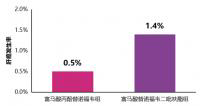Hepatology:不止免疫抑制剂和抗肿瘤药物能再激活乙肝病毒
有乙型肝炎病毒(HBV)感染史的患者在接受化疗或者免疫抑制剂治疗后,可能HBV会复活。而HBV的再次激将会引起严重后果甚至可能致命。不过这可能只是冰山一角。这篇review文章发表在近期的Hepatology杂志上。
乙型肝炎由体液接触传播,导致急性或慢性肝炎。接种疫苗有助于控制乙肝病毒的传播。医学统计估计,全球人口有10%感染有慢性HBV.
美国食品和药物管理局(FDA)曾于2013年9月签署了一份药物安全沟通书,表示警告免疫抑制和抗癌药物奥法木单抗(Arzerra ofatumumab)和利妥昔单抗(Rituxan)引起的HBV再激活。奥法木单抗和利妥昔单抗是单克隆抗体治疗的药物,从免疫系统B细胞中找到,靶向蛋白CD20.这些抗CD20的药物被用于治疗自身免疫性疾病,白血病,淋巴瘤和移植排斥。
文章主要作者阿德里安博士说道:“虽然FDA要求临床医生开始使用奥法木单抗和利妥昔单抗之前,筛查患者乙肝以防止病毒复发,但这可能只是冰山的一角。”
检测HBV感染,医生会检测患者的血液,寻找的乙肝表面抗原(HBsAg)。HBsAg抗体在所有HBV患者都存在,甚至在HBsAg清除后,这表示为疾病的再活化的可能。HBV再激活可能引起严重的急性肝功能衰竭,甚至死亡。曾有研究报告表示HBV再复活有25%的致死率。
作者在系统文献回顾后,总结了有关HBV再激活的504例病例。虽然目前还不清楚如何HBV再发生,专家认为,免疫损伤同时病毒**可能引发这一进程。乙肝病毒的再活化可以与化疗,器官和组织移植,高剂量的皮质类固醇使用和用于治疗风湿性疾病靶向肿瘤坏死因子-α(TNF-α)的抗TNF药物,包括类风湿性关节炎,消化系统疾病包括克罗恩病和结肠炎,以及皮肤病,如牛皮癣。
研究人员总结表明,HBV激活的问题可能远远超出了使用两个抗CD20药物引起的情况。进一步研究各种医学学科之间的合作将有助于扩大HBV再激活的理解。
DOI: 10.1002/hep.27609
Recent US Food and Drug Administration warnings on hepatitis B reactivation with immune-suppressing and anticancer drugs: Just the tip of the iceberg?
Adrian M. Di Bisceglie, Anna S. Lok, Paul Martin, Norah Terrault, Robert P. Perrillo and Jay H. HoofnagleAbstract
Reactivation of hepatitis B in the context of immunosuppressive therapy may be severe and potentially fatal. The US Food and Drug Administration has recently drawn attention to the potentially fatal risk of hepatitis B reactivation in patients receiving the anti-CD20 agents ofatumumab or rituximab. This action focuses attention on the broader issue of hepatitis B virus reactivation, which may occur with a wide variety of immunosuppressive therapies in benign or malignant disease. This article summarizes the data behind this issue. These data support the recommendation that all patients undergoing chemotherapy, immunosuppressive therapy, hematopoietic stem cell transplantation, or solid organ transplantation be screened for active or prior hepatitis B viral infection by testing for hepatitis B surface antigen and the antibody to hepatitis B core antigen in serum. Those who are found to be hepatitis B surface antigen–positive should start appropriate antiviral therapy to prevent reactivation. Additionally, even those who have recovered from hepatitis B will benefit from antiviral therapy in certain circumstances because of the risks associated with a form of hepatitis B virus reactivation referred to as “reverse seroconversion.” There remain many uncertain areas that warrant further study, and further advances will benefit from close interactions between various medical specialties, regulatory agencies, and researchers. Conclusions: There is good evidence to support routine screening of all patients for hepatitis B prior to undergoing chemotherapy or immunosuppressive treatment; use of prompt antiviral treatment appears to diminish the risk of severe or fatal reactivation of hepatitis B. (Hepatology 2015;61:703-711)
本站所注明来源为"爱爱医"的文章,版权归作者与本站共同所有,非经授权不得转载。
本站所有转载文章系出于传递更多信息之目的,且明确注明来源和作者,不希望被转载的媒体或个人可与我们
联系zlzs@120.net,我们将立即进行删除处理
热点图文
-
AASLD2018研究进展丨慢乙肝患者治疗期间的肾脏安全管理
在新药取得成功之前,应用口服核苷(酸)类似物(NA)治疗慢性乙型肝炎(简称...[详细]
-
快讯丨TAF治疗4年的肝细胞癌发生率低于TDF
5月17日,在第十届全国疑难及重症肝病大会上,我国香港大学司徒伟基教授交流...[详细]


